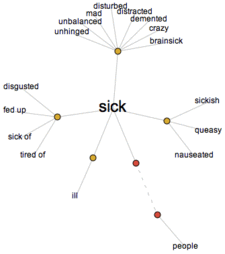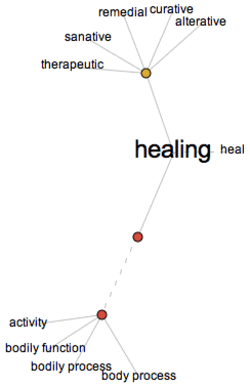Posted by Diane Morrow on October 10, 2006 in Healing Language and Healing Images
The World Book Dictionary defines heal this way: “to make whole, sound or well; bring back to health; cure”. At WordNet, an online database developed at Princeton University, healing is defined as “the natural process by which the body repairs itself”. And here is how three women—all in various stages of recovery from cancer—and all participating in an ongoing writing and healing group—pictured healing on one morning in North Carolina a couple of years ago. The following excerpt is from my notes: “Healing is movement,” E. said. “What do you see when you hear the word movement?” I asked her. “What do you see inside your head?” “I’m mulching,” she said. “I’m working in my garden, raking. I’m thinking about this tee shirt I have that says, ‘I’m not getting older, I just need repotting.’" “Healing is the apex,” S. said. “Healing is eureka.” “What do you see with eureka?” I asked. “I see myself throwing my hands up in the air,” she said. “After I’d gotten good news on the telephone. The doctor called. I was so afraid it was going to be bad news, but then it was good news.” Healing is mulching, raking, repotting. Healing is the apex, eureka. Healing is not just one thing. “Healing,” N. said, “is a taskmaster.” There was this pause, I remember, after N. spoke. I could feel a slight shift in the room. N. had stage four breast cancer. The tumor had spread to her liver and bones. In the past couple months she’d become so much frailer than when I first knew her. But, still, the fierce intelligence was there. “Would you mind terribly,” I asked, “If I were to ask you what you see in your head when you hear the word taskmaster?” N. answered immediately. “Ichabod Crane.” Ichabod Crane is that stooped and bony schoolmaster in Washington Irving’s “The Legend of Sleepy Hollow.” He teaches in a one-room schoolhouse. When students don’t study properly he strikes them with a birch rod, the rod landing with a sharp thwack on their shoulders. Is this what healing is like sometimes? Is this what healing is like sometimes for some people? Is this what healing can be like sometimes for all of us? Healing is therapeutic, sanative, alterative. It’s making whole. It’s making well. It’s the natural process by which the body repairs itself. Healing is repair, therapy, movement, mulching, raking, repotting. Healing is the apex. Healing is eureka. Healing is a taskmaster. Healing is not just one thing. What do you see inside your head when you hear—or say—the word healing? What are the words and images that get at the truth of it?...
read more


